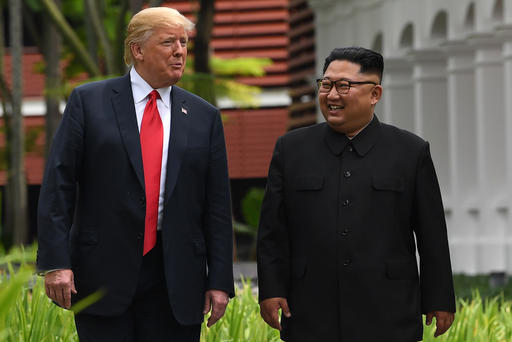Washington, March 9: In Hanoi, Donald Trump overturned the widely held assumption he would be willing to settle for an interim agreement on North Korea’s denuclearisation.
But despite the breakdown of the summit and the atmosphere of skepticism that now abounds, the US president seems determined to stick with his “all or nothing” approach, betting on his personal “chemistry” with Kim Jong Un to save the day.
Trump insisted Friday his relationship with Kim “remains good” even as his aides attempted to paper over the collapse of the high-stakes second summit which concluded last week without even a modest deal on reducing Pyongyang’s nuclear program in exchange for sanctions relief.
“Nobody in the administration advocates a step-by-step approach,” a senior State Department official told reporters this week. In other words, Washington wants what administration officials have called a “big deal” – “the complete elimination of their weapons of mass destruction program,” the State Department official said.
In return, Washington would ease the pain of the crippling sanctions that have strangled the isolated North’s economy.
“It really seems there’s an all or nothing approach right now from the administration,” Frank Aum, a former advisor to the Pentagon, said at a recent meeting hosted by the United States Institute of Peace (USIP).
“That seems to be backtracking” which “the Kim regime would not be very happy about,” Aum added. It’s a position that has taken many observers by surprise given how, in the run-up to the summit, the administration dropped numerous hints it was willing to take a more incremental approach to the talks.
“In no rush” was how Trump repeatedly described his stance — a position echoed by his Secretary of State Mike Pompeo, who emphasised: “We’ve always known this would be a long process.” The administration’s point man on North Korea, Stephen Biegun, said the US would be prepared to pursue commitments “simultaneously and in parallel” while suggesting there was room for maneuver when it came to sanctions.
That created the impression that Washington could be willing to countenance the step-by-step disarmament and sanctions relief sought by Pyongyang. But when Kim proposed dismantling the Yongbyon nuclear complex in exchange for lifting the main sanctions, Trump refused.
“It has very much been characteristic of past negotiations to take an incremental approach to this that stretches it out over a long period of time, and quite honestly, has failed on previous occasions,” the senior State Department official said. In Washington, the new line has been interpreted as a victory for National Security Advisor John Bolton, long a hawk on North Korea, over Pompeo and Biegun.
Even as Washington increasingly turns its attention toward next year’s presidential election, the administration exhumed a goal that has long been buried and seen as unrealistic by experts: the total denuclearization of North Korea by the end of Trump’s term in 2021. For Jenny Town of the 38 North think tank, the lack of even a partial accord has meant “we have lost that momentum” created by last year’s rapprochement.
